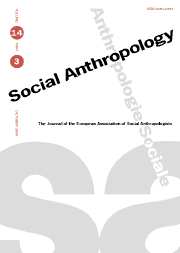Crossref Citations
This article has been cited by the following publications. This list is generated based on data provided by
Crossref.
Runciman, W.G.
2008.
Forgetting the Founders.
The Sociological Review,
Vol. 56,
Issue. 3,
p.
358.
Fraser, J
Cardoso, T
Junqueira, A
Falcão, NPS
and
Clement, CR
2009.
Amazonian Dark Earths: Wim Sombroek's Vision.
p.
229.
Kidd, Christopher
2009.
Inventing the “Pygmy”: Representing the “Other”, Presenting the “Self”.
History and Anthropology,
Vol. 20,
Issue. 4,
p.
395.
Withagen, Rob
and
van Wermeskerken, Margot
2010.
The Role of Affordances in the Evolutionary Process Reconsidered.
Theory & Psychology,
Vol. 20,
Issue. 4,
p.
489.
Porr, Martin
2010.
Art und rock-art of the Kimberley, Northwest Australia: Narratives, interpretations and imaginations.
EAZ – Ethnographisch-Archaeologische Zeitschrift,
Vol. 51,
Issue. 1/2,
p.
173.
Brinkmann, Svend
2011.
Can We Save Darwin from Evolutionary Psychology?.
Nordic Psychology,
Vol. 63,
Issue. 3,
p.
50.
Silva, Regina Coeli Machado e
2011.
A teoria da pessoa de Tim Ingold: mudança ou continuidade nas representações ocidentais e nos conceitos antropológicos?.
Horizontes Antropológicos,
Vol. 17,
Issue. 35,
p.
357.
Bevilaqua, Ciméa Barbato
2011.
Chimpanzés em juízo: pessoas, coisas e diferenças.
Horizontes Antropológicos,
Vol. 17,
Issue. 35,
p.
65.
L’Abate, Luciano
2012.
Paradigms in Theory Construction.
p.
69.
Porr, Martin
and
Bell, Hannah Rachel
2012.
‘Rock-art’, ‘Animism’ and Two-way Thinking: Towards a Complementary Epistemology in the Understanding of Material Culture and ‘Rock-art’ of Hunting and Gathering People.
Journal of Archaeological Method and Theory,
Vol. 19,
Issue. 1,
p.
161.
Witherington, David C.
and
Heying, Shirley
2013.
Vol. 44,
Issue. ,
p.
161.
Pagnotta, Murillo
and
Resende, Briseida Dogo
2013.
A controvérsia em torno da atribuição de cultura a animais não humanos: uma revisão crítica.
Estudos de Psicologia (Natal),
Vol. 18,
Issue. 4,
p.
569.
Meloni, Maurizio
2014.
How Biology Became Social, and What it Means for Social Theory.
The Sociological Review,
Vol. 62,
Issue. 3,
p.
593.
Pagnotta, Murillo
2014.
On the controversy over non-human culture: The reasons for disagreement and possible directions toward consensus.
Behavioural Processes,
Vol. 109,
Issue. ,
p.
95.
Lock, Margaret
2015.
Comprehending the Body in the Era of the Epigenome.
Current Anthropology,
Vol. 56,
Issue. 2,
p.
151.
Silva, Gláucia
and
Duarte, Luiz Fernando Dias
2016.
Epigênese e epigenética: as muitas vidas do vitalismo ocidental.
Horizontes Antropológicos,
Vol. 22,
Issue. 46,
p.
425.
Marková, Ivana
2016.
The Dialogical Mind.
Niewöhner, Jörg
Bruns, Antje
Haberl, Helmut
Hostert, Patrick
Krueger, Tobias
Lauk, Christian
Lutz, Juliana
Müller, Daniel
and
Nielsen, Jonas Ø.
2016.
Land Use Competition.
p.
1.
Rotman, Deborah L.
and
Fuentes, Agustín
2016.
Mormon and Irish Landscapes on Beaver Island, Lake Michigan – niche construction and socio-ecological inheritance in the nineteenth century.
Landscapes,
Vol. 17,
Issue. 1,
p.
62.
Gettler, Lee T.
2016.
Becoming DADS.
Current Anthropology,
Vol. 57,
Issue. S13,
p.
S38.




